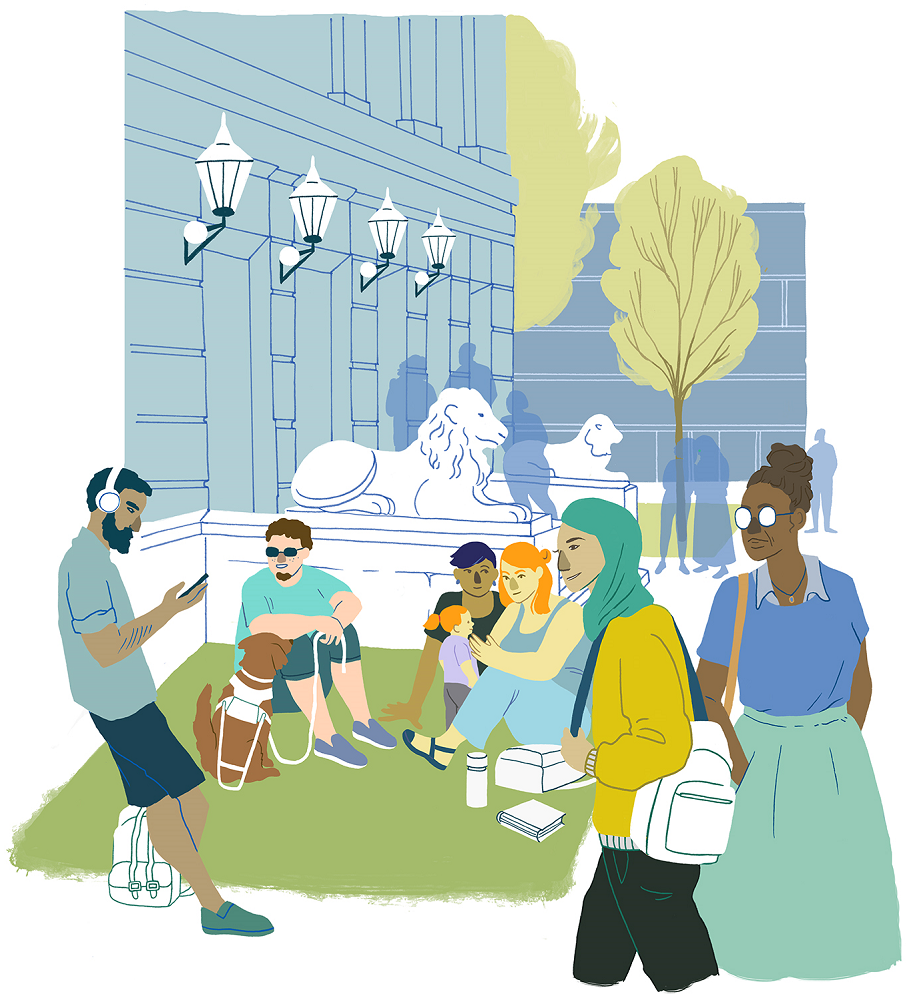Rassismus und Antisemitismus
Der terroristische Angriff der Hamas auf Israel am 07. Oktober 2023 und die seitdem anhaltende kriegerische Gewalteskalation haben nicht nur entsetzliche Auswirkungen auf die Zivilbevölkerung in Israel und im Gazastreifen. In Folge dessen ist auch ein erneuter alarmierender Anstieg von Hass, Hetze und Gewalttaten in Deutschland zu verzeichnen, der auch vor Universitäten nicht Halt macht.
Antisemitismus und Rassismus werden an der Uni Halle nicht geduldet. Auf dieser Seite finden Sie Informationen zu Angeboten der Universität Halle sowie in der Stadt Halle (Saale) und der Region für Menschen, die von Rassismus und/oder Antisemitismus betroffen sind.

Statements und Richtlinien der MLU

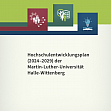
Hochschulentwicklungsplan (2024–2029)
Das Kaptitel 6.4 des Hochschulentwicklungsplans (HEP) widmet sich dem Thema "Vielfalt und Chancengleichheit" und findet sich auf Seite 55 bis 62. Hier finden sich auch Ausführungen zu den Themen Rassismus und Antisemitismus.
[ mehr ... ]

Erklärung für Demokratie, Vielfalt, Toleranz und Weltoffenheit
Der Akademische Senat der Universität Halle hat in seiner Sitzung vom 24.01.2024 eine Erklärung verabschiedet, die den Beitrag der Universität zu Demokratieförderung und einem friedlichen Miteinander in der Welt in den Fokus stellt.
[ mehr ... ]
Aufruf: "Wehrhafte Demokratie ernst nehmen – über AfD-Verbot nachdenken"
Im Januar 2024 unterzeichneten zahlreiche Wissenschaftler*innen der MLU den Aufruf: "Wehrhafte Demokratie ernst nehmen – über AfD-Verbot nachdenken":
"Unsere Demokratie ist derzeit so herausgefordert wie lange nicht. Sie ist keine Schönwetterveranstaltung, sondern muss sich dann bewähren, wenn es schwierig wird. Streit ist in einer Demokratie konstitutiv und muss zugleich jederzeit auf der Wertebasis unserer freiheitlichen Verfassungsordnung ausgetragen werden. Als Lehrende der Martin-Luther-Universität Halle-Wittenberg empfinden wir eine besondere Verantwortung, für die freiheitlich-demokratische Grundordnung einzutreten. Die „Alternative für Deutschland“ gefährdet diese in einem nicht mehr akzeptablen Ausmaß. Offenkundig hat jüngst der AfD-Fraktionsvorsitzende in Sachsen-Anhalt an einer Runde zum „Masterplan Remigration“ teilgenommen, und dies erinnert an dunkelste Stunden der deutschen Geschichte. Es bestätigt, was der Verfassungsschutz schon länger sagt und jeder kundige Beobachter weiß: Die AfD ist gesichert rechtsextrem.
Die freiheitlich-demokratische Grundordnung lässt keinen Raum für Positionen, die diese abschaffen oder verächtlich machen wollen – und verlangt zugleich ein Höchstmaß an Toleranz gegenüber politisch und weltanschaulich Andersdenkenden. Doch die wehrhafte Demokratie ist nicht wehrlos, wenn es darauf ankommt. Neben einem Betätigungsverbot für erwiesenermaßen rechtsextreme Personen oder dem Entzug der Finanzierungsgrundlage einer rechtsextremen Partei ist als letztes Mittel auch ein Parteiverbot möglich. Dieses hat zu Recht hohe Hürden und kommt nur dann infrage, wenn das Bundesverfassungsgerichtfeststellt, dass eine Partei aktiv und planvoll auf die Beeinträchtigung bzw. Beseitigung der freiheitlich-demokratischen Grundordnung abzielt. Es wird immer sichtbarer, dass die AfD genau dies tut. Zudem darf es nicht folgenlos bleiben, wenn ein Landesamt für Verfassungsschutz die AfD als gesichert rechtsextrem einstuft. Wir fordern eine Intensivierung der Debatte über den angemessenen Umgang mit der AfD, an deren Ende auch ein Verbotsantrag stehen kann.“
[ mehr ... ]
Statement der Rektorin: „Wir dulden keinen Antisemitismus auf unserem Campus.“
In der Sitzung des Akademischen Senats vom 08.11.2023 gab Rektorin Prof. Dr. Claudia Becker zu Beginn des hochschulöffentlichen Teils ein Statement ab, welches sie anlässlich des Aushangs eines nicht genehmigten, antisemitischen Transparents auf dem Steintor-Campus verlas:
„Wir dulden keinen Antisemitismus auf unserem Campus.
In Übereinstimmung mit dem Statement des HRK-Präsidenten, Prof. Dr. Walter Rosenthal, dulden wir keine Gewalt,`weder verbal noch physisch, keinen Antisemitismus, keinerlei Rassismus`. Wir alle sind in der Verantwortung, eine respektvolle Lehr-, Lern-, Forschungs- und Arbeitsumgebung zu schaffen, in der sich die Menschen an unserer Universität sicher fühlen können. Gewalt, Einschüchterung, Kundgebungen, sei es verbal oder in Print, die antisemitisch geprägt sind oder Terror gutheißen, werden wir nicht tolerieren.
Nur wenn wir alle gemeinsam gegen Hass, Rassismus, Antisemitismus aufstehen, können wir wirksam für Frieden, Freiheit und Demokratie einstehen."
Das Statement fand die uneingeschränkte Unterstützung aller Senatsmitglieder. Verbunden mit ihrem Statement forderte sie alle Mitglieder und Angehörigen der Universität auf, aktiv zu werden und gewaltfrei einzuschreiten, wenn sie auf Vorfälle aufmerksam werden. So sollten ohne Genehmigung ausgehängte Plakate, Aushänge, Banner oder ähnliches abgenommen werden, ohne sich dabei selbst in Gefahr zu bringen. Sie bat ferner darum, das Büro der Rektorin oder des Kanzlers im Nachgang zu informieren und gegebenenfalls die Polizei zu rufen.
Sie informierte abschließend darüber, dass ein Verstoß, der zwei Tage zuvor stattgefunden hatte, zur Anzeige gebracht wurde. Der Kanzler Herr Funk ergänzte, dass auch der Staatsschutz eingeschaltet worden sei.
[ mehr ... ]
Statement der Rektorin zu Terrorangriffen auf Israel
Die Universität Halle verurteilt die Terrorangriffe auf Israel. In einem Statement vom 11.10.2023 äußert sich Rektorin Prof. Dr. Claudia Becker zur aktuellen Situation:
"Wir sind zutiefst entsetzt über die gewalttätigen Angriffe auf die gesamte israelische Bevölkerung. Unser Mitgefühl gilt allen, die von diesen schrecklichen Anschlägen betroffen sind und die um ihre Freunde und Familien trauern und bangen - insbesondere auch unseren Studierenden und Forschenden in und aus Israel. Die Universität Halle steht an der Seite ihrer akademischen Partner, zu denen sie seit vielen Jahren intensive Beziehungen pflegt. Frieden, Demokratie und Freiheit sind unantastbare Werte."
[ mehr ... ]

Diversity Statement
Der Akademische Senat der Universität Halle verabschiedete am 14.04.2021 ein Diversity Statement, in dem sich die Universität u.a. für die Wertschätzung, Unterstützung und den Diskriminierungsschutz von Personen aller ethnischen Herkünfte und Religionen ausspricht.
[ mehr ... ]

Richtlinie zum Schutz vor Diskriminierung, (sexueller) Belästigung und Gewalt
In ihrer Richtlinie zum Schutz vor Diskriminierung, (sexueller) Belästigung und Gewalt verbietet sie u.a. Diskriminierung, (sexuelle) Belästigung und Gewalt aufgrund der ethnischen Herkunft oder Religion und verpflichtet ihre Studierenden und Beschäftigten, zu einem diskriminierungs- und gewaltfreien Studien- und Arbeitsklima beizutragen. Für Personen, die Diskriminierung, (sexuelle) Belästigung oder Gewalt in universitären Kontexten erleben, stehen vertrauliche Beratungsangebote und offizielle Beschwerdemöglichkeiten zur Verfügung.
[ mehr ... ]
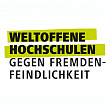
Aktion: Weltoffene Hochschule
Die MLU wendet sich mit den anderen Hochschulen in einer bundesweiten Aktion gegen Fremdenfeindlichkeit und Nationalismus und tritt offensiv für Aufgeschlossenheit und Weltoffenheit ein. Die Hochschulen reagieren damit auf rassistisch motivierte verbale und physische Gewalt in Deutschland und auf Abschottungstendenzen in etlichen Staaten. Sichtweisen, Meinungsvielfalt, und internationaler Austausch sind Grundlagen der Forschungs- und Lehrtätigkeit an Hochschulen. Angesichts zunehmender fremdenfeindlicher Tendenzen und des steigenden Erfolgs populistischer Parolen fühlen sich die Hochschulen gefordert, für diese Werte gemeinsam offensiv einzutreten. Die Hochschulleitungen wollen die Hochschulmitglieder im Widerstand gegen Fremdenhass bestärken und auch in ihren regionalen und internationalen Netzwerken entsprechend wirken. Ein offener und internationaler Campus und die internationale Mobilität von Lehrenden und Lernenden sind essentielle Grundlagen für qualitätsvolles Lehren, Lernen und Forschen.
[ mehr ... ]

Offener Brief zum Umgang mit der Identitären Bewegung
Im Januar 2018 veröffentlichten das Rektorat und der StuRa der MLU einen Offenen Brief bezüglich der zu diesem Zeitpunkt noch am Steinor-Campus präsenten Identitären Bewegung.
[ mehr ... ]

Beratungs- und Unterstützungsstellen

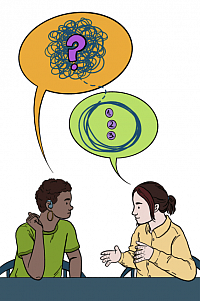
Illustration Beratung (MLU / Louie Läuger)
Sie haben eine rassistische oder antisemitische Situation erlebt oder beobachtet? Sie können sich an folgende Beratungsstellen wenden. Hier erhalten sie vertrauliche Unterstützung und werden über Schutz- und Handlungsmöglichkeiten beraten. Alle Informationen, persönlichen Daten und Gesprächsinhalte werden vertraulich behandelt. Die Beratungsstellen werden im konkreten Einzelfall nur mit Einverständnis der betroffenen Person aktiv.
Präventions- und Beratungsstelle Antidiskriminierung der MLU
Studierende und Gäste der MLU, die rassistische, antisemitische, antimuslimische oder andere Diskriminierung im Unikontext erfahren oder beobachten, können sich vertraulich an Sabine Wöller von der Präventions- und Beratungsstelle Antidiskriminierung der Uni Halle wenden. Beratungen sind in deutscher und englischer Sprache und auf Wunsch auch anonym möglich. Termine können individuell per E-Mail vereinbart werden.
![Foto: Sabine Wöller (Fotografin: Friederike Stecklum)
[Bildbeschreibung: Sabine Wöller steht auf dem Universitätsplatz, im Hintergrund
ist das Audimax zu sehen. Sie trägt ein schwarz-weiß gemustertes Hemd und einen
schwarzen Blazer, hat eine rot gefärbte Strähne und schaut lächelnd in die
Kamera.]](/im/1657270494_2670_00_420.jpg)
Foto: Sabine Wöller (Fotografin: Friederike Stecklum)
[Bildbeschreibung: Sabine Wöller steht auf dem Universitätsplatz, im Hintergrund
ist das Audimax zu sehen. Sie trägt ein schwarz-weiß gemustertes Hemd und einen
schwarzen Blazer, hat eine rot gefärbte Strähne und schaut lächelnd in die
Kamera.]
Kontakt
Martin-Luther-Universität Halle-Wittenberg
Stabsstelle Vielfalt und Chancengleichheit
Präventions- und Beratungsstelle Antidiskriminierung
Sabine Wöller
Raum 303, 3. OG
Dachritzstraße 12
06108 Halle (Saale)
Link zur Anfahrt
Telefon: 0345-55 21013
antidiskriminierung@uni-halle.de
Webseite
Instagram
Postanschrift:
Martin-Luther-Universität Halle-Wittenberg
Stabsstelle Vielfalt und Chancengleichheit
Präventions- und Beratungsstelle Antidiskriminierung
Sabine Wöller
06099 Halle (Saale)
Sozial- und Konfliktberatungsstelle der MLU
Beschäftigte der MLU, die rassistische, antisemitische, antimuslimische oder andere Diskriminierung im Unikontext erfahren oder beobachten, können sich vertraulich an Anke Märker von der Sozial- und Konfliktberatungsstelle der Uni Halle wenden.
![Foto: Sozial- und Konfliktberatungsstelle
(Fotograf: Michael Deutsch)
[Bildbeschreibung: Das Foto zeigt Anke Märker, die sich lachend zwischen zwei
Fäuste, die mit roten Boxhandschuhen versehen sind, stellt. Sie trägt eine
gemusterte Bluse und hat braune Haare, die zu einem Zopf gebunden sind.]](/im/1657276145_2670_00_420.jpeg)
Foto: Sozial- und Konfliktberatungsstelle
(Fotograf: Michael Deutsch)
[Bildbeschreibung: Das Foto zeigt Anke Märker, die sich lachend zwischen zwei
Fäuste, die mit roten Boxhandschuhen versehen sind, stellt. Sie trägt eine
gemusterte Bluse und hat braune Haare, die zu einem Zopf gebunden sind.]
Beauftragte für internationale Studierende und Wissenschaftler*innen des akademischen Senats
Die Beauftragte für internationale Studierende und Wissenschaftler*innen fungiert als Vertrauensperson und Ansprechpartnerin für die internationalen Studierenden und Wissenschaftler*innen der MLU bei Problemen innerhalb der Hochschule sowie mit Behörden und Einrichtungen der Stadt Halle.
![Foto: Prof. Dr. Anita von Poser
[Bildbeschreibung: Das Foto zeigt Prof. Dr. Anita von Poser vor einem grauen
Hintergrund. Sie trägt ein dunkelblaues Shirt, hat Schulterlange braune Haare und
lacht in die Kamera.]](/im/1681717876_2670_00_420.jpeg)
Foto: Prof. Dr. Anita von Poser
[Bildbeschreibung: Das Foto zeigt Prof. Dr. Anita von Poser vor einem grauen
Hintergrund. Sie trägt ein dunkelblaues Shirt, hat Schulterlange braune Haare und
lacht in die Kamera.]
Kontakt
Martin-Luther-Universität Halle-Wittenberg
Institut für Ethnologie
Beauftragte für internationale Studierende und Wissenschaftler*innen des akademischen Senats
Prof. Dr. Anita von Poser
Reichardtsraße 11
06114 Halle (Saale)
Telefon: 0345-5524191
anita.poser@ethnologie.uni-halle.de
Webseite
International Office der MLU
Die MLU betreibt einen regen internationalen Austausch mit Hochschulen aus der ganzen Welt. Rund 2.000 internationale Studierende und 500 internationale Wissenschaftler*innen beleben täglich das Universitäts- und Stadtleben. Das Team des International Office berät zu Finanzierungs- und Fördermöglichkeiten, Betreuungsangeboten und Sprachkursen und betreut ausländische Gäste und Studierende auf dem Weg an die MLU sowie während ihres Aufenthaltes. Gemeinsam mit dem Referat Personalentwicklung hat das International Office das Zertifikatsprogramm „Internationale Kompetenz“ entwickelt, das zur Förderung der internationalen Kompetenzen der Beschäftigten durch verschiedene Angebote beiträgt. Beschäftigte und Auszubildende der MLU erhalten das Zertifikat, sobald sie die Module „Fremdsprachenkompetenz“, „Interkulturelle Sensibilisierung“ und „Internationaler Austausch“ erfolgreich absolviert haben.
Weitere Informationen finden Sie auf der Webseite des International Office und auf deren Instagram-Seite .
Referat für Internationale Studierende des Studierendenrates der MLU

Logo Referat für internationale Studierende
Der Studienalltag von internationalen Studierenden ist von vielen Hürden und Herausforderungen geprägt. Eventuelle Sprachbarrieren, die deutsche Bürokratie mit ihren vielen Formularen und Anforderungen und kulturelle Missverständnisse machen ihnen das Leben und den Studienalltag erst einmal schwer. Das Referat für Internationales hilft den internationalen Studierenden dabei, Antworten auf ihre Fragen zu finden und unterstützt sie dabei, im deutschen Alltag zurechtzukommen. Es hält ebenso Kontakt zu Initiativen und den universitären Einrichtungen und versucht, konkrete Hilfe bei auftretenden Problemen zu leisten.
[ mehr ... ]
Hilfe für ausländische Studierende e. V. (HauS) der MLU
Der 1994 gegründete Verein unterstützt unverschuldet in Not geratene ausländische Studierende aus Mitgliedsbeiträgen und Spenden. Die finanzielle Hilfe erfolgt nach sorgfältiger Prüfung möglichst kurzfristig und unbürokratisch, z.B. durch Übernahme von Mieten, Krankenversicherung, Beihilfen zum Lebensunterhalt vor Zwischen- und Abschlussprüfungen.
[ mehr ... ]
Landesstudienkolleg Halle
Das Landesstudienkolleg Sachsen-Anhalt ist das erste Landesstudienkolleg der Bundesrepublik Deutschland. Es ist eine gemeinsame Einrichtung der MLU und der Hochschule Anhalt. Es vermittelt insbesondere Studierenden ausländischer Herkunft, deren Vorbildungsnachweise einer deutschen Hochschulzugangsberechtigung nicht entsprechen, die erforderlichen Voraussetzungen für ein erfolgreiches Hochschulstudium, einschließlich der hinreichenden Kenntnisse der deutschen Sprache.
Mit einem speziellen Programm fördert das Studienkolleg an der MLU seit Mai 2016 Geflüchtete, die ein Studium in Sachsen-Anhalt aufnehmen möchten. Ziel dieses Förderprogramms ist es, Studienbewerber mit Fluchthintergrund sprachlich, fachlich und methodologisch so vorzubereiten, dass ein Studium in deutscher Sprache an der Martin-Luther-Universität Halle-Wittenberg, in Sachsen-Anhalt oder an einer anderen deutschen Hochschule möglich wird.
[ mehr ... ]
Uniexterne Beratungs- und Unterstützungsstellen

Mobile Opferberatung – Unterstützung für Betroffene rechter,
rassistischer und antisemitischer Gewalt
Die Mobile Opferberatung berät und unterstützt Betroffene und deren soziales Umfeld nach einem rechten, rassistischen, antisemitischen, sozialdarwinistischen oder LSBTTIQ*-feindlichen Angriff. Die Beratung erfolgt unabhängig und parteilich, kostenlos und auf Wunsch anonym. Sie findet in den Räumlichkeiten der Mobilen Opferberatung, aufsuchend vor Ort oder online statt.
[ mehr ... ]
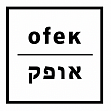
OFEK Sachsen-Anhalt – Beratung und Meldestelle Antisemitismus
OFEK e.V. berät und unterstützt Betroffene, Angehörige sowie Zeug*innen antisemitischer Vorfälle und Gewalttaten und bringt jüdische Perspektiven in die gesellschaftliche sowie politische Debatte ein.
Die Meldestelle Antisemitismus RIAS Sachsen-Anhalt in Trägerschaft von OFEK dokumentiert landesweit antisemitische Vorfälle. Sie arbeitet in enger Kooperation mit jüdischen Organisationen und zivilgesellschaftlichen Beratungsnetzwerken vor Ort und ist Mitglied in der Bundesarbeitsgemeinschaft des Bundesverbands der Recherche- und Informationsstellen Antisemitismus e.V. (RIAS e.V.). Gemeldete Vorfälle aus Sachsen-Anhalt werden vom regionalen Team aufgenommen und über die Plattform des Bundesverbandes erfasst. Die Meldenden bleiben auf Wunsch anonym.
[ mehr ... ]
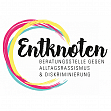
Entknoten – Beratungsstelle gegen Alltagsrassismus und Diskriminierung
Entknoten berät und unterstützt im Fall von Alltagsrassismus und rassistischer Diskriminierung. Die Beratung erfolgt unabhängig, vertraulich, kostenlos und auf Wunsch anonym. Das Beratungsteam berät in Deutsch, Englisch und Farsi. Bei Bedarf können Sprachmittler*innen organisiert werden. Das Büro ist weitestgehend barrierefrei zugänglich.
[ mehr ... ]

Gedenken an Anton Wilhelm Amo an der MLU

Anton Wilhelm Amo gilt als erster und über sehr lange Zeit einziger afrodeutscher Akademiker. Er studierte in Halle und in Wittenberg, wo er 1734 auch promoviert wurde. Seine Hallenser Disputation widmete sich der Rechtsstellung Schwarzer Menschen in Europa (De iure Maurorum in Europa), die Wittenberger Dissertation dem Leib-Seele-Thema (De humanae mentis apatheia). Amo wirkte dort, sowie ab 1736 in Halle und im Jahre 1739 in Jena als Dozent der Philosophie.
Amo widmete sich u.a. dem Recht Schwarzer Menschen in Europa. Seine Kritik galt rational nicht zu begründenden Gesetzen sowie Rechtsauslegungen, die sich allein am Wohl der Gesetzgeber ausrichten. Mit seiner Mahnung zur Humanität in der Jurisprudenz, die im Zweifelsfall immer Vorrang vor dem strengen Recht haben soll, hat er sich als ein früher Verfechter von Menschenrechten erwiesen.

Rektoratskommission Anton-Wilhelm-Amo
2019 gründete die MLU eine Arbeitsgruppe, die inzwischen als Rektoratskommission „Anton Wilhelm Amo" aktiv ist und sich dem würdigen Gedenken an Amo als ersten afrodeutschen Universitätsangehörigen widmet. Die Erinnerung an seine Person und an sein Werk ist Teil der Universitätsgeschichte und damit der Gegenwart. Sie erinnert daran, dass Universitäten allen Menschen offen stehen müssen, unabhängig von ethnischen, religiösen oder anderen Zugehörigkeiten. Sie geschieht jenseits von Stereotypisierungen im Namen von Diskriminierungsfreiheit und mit Wachsamkeit für ungerechte Machtdynamiken. Die MLU agiert im öffentlichen Raum und mit verschiedenen Gruppen und Institutionen. Sie versucht durch die aktive, lebendige und offene Erinnerung an Amo mit Lectures, Preisverleihungen, Namensgebungen und einem angemessenen öffentlichen Gedenkort den Blick zu weiten und zugleich zu schärfen und damit auch heutige Spannungen zwischen gesellschaftlicher Teilhabe und Diskriminierung sichtbar zu machen.
Die derzeitige Zusammenordnung der Amo-Gedenktafel mit der Bronzeplastik „Freies Afrika" auf dem Universitätsplatz ist unpassend und prekär. Sie wurde im Sommersemester 2021 durch eine Edelstahltafel ergänzt, die auf eine Neuformierung des Gedenkens hinweist.
Auf einer Sonderseite des Prorektorates für Forschung und Lehre der MLU finden Sie umfassende Informationen zu zur Arbeit der Kommission zusammengetragen.
[ Sonderseite Anton Wilhelm Amo ]
[ mehr ... ]
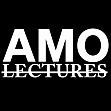
Amo Lectures
Die ANTON WILHELM AMO LECTURES werden seit 2013 jährlich an der Martin-Luther-Universität Halle-Wittenberg vom Forschungsschwerpunkt "Gesellschaft und Kultur in Bewegung" organisiert. In ihnen stellen international renommierte Wissenschaftler*innen ihre aktuellen Forschungen zu Themen vor, die mit dem Werk von Amo verbunden sind oder von ihm ausgehen.
[ mehr ... ]
Anton-Wilhelm-Amo-Preis
Zum Andenken an Anton Wilhelm Amo und ihm zu Ehren verleiht die MLU seit 1994 jährlich den Anton-Wilhelm-Amo-Preis für Diplom-, Magister-, Staatsexamens- und Masterarbeiten oder vergleichbare Leistungen, wobei bevorzugt Arbeiten von ausländischen Absolvent*innen berücksichtigt werden. Die Wahl Amos als Namensgeber dieses Preises soll betonen, dass die MLUoffen steht für alle Menschen, unabhängig von Religion und Kultur, Hautfarbe und Herkunft.
[ mehr ... ]
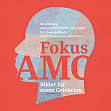
Kunst trifft Erinnerungskultur: Neue Ausstellung zu Amo an der MLU
Wie könnte eine zeitgemäße Erinnerung an Anton Wilhelm Amo aussehen, über dessen Leben und Aussehen wenig bis gar nichts bekannt ist? Mit dieser Frage befasst sich die neue Ausstellung "Fokus Amo. Bilder für einen Gelehrten" der Martin-Luther-Universität Halle-Wittenberg (MLU), die ab Freitag, 20. Oktober 2023, im Löwengebäude zu sehen ist. Neun Künstlerinnen und Künstler haben dafür ein gemeinsames Werk geschaffen, das sich dem Menschen und seinem Leben annähert.
[ mehr ... ]
Universität benennt Hörsaal nach Anton Wilhelm Amo
Der Hörsaal IV am Steintor-Campus hat einen neuen Namen: Im November 2024 wurde er in "Hörsaal Anton Wilhelm Amo" umbenannt und erinnert an den bedeutenden Alumnus der Universität. An der Veranstaltung nahm auch die Botschafterin der Republik Ghana I. E. Gina Ama Blay teil. Anschließend schrieb sie sich in das Goldene Buch der Universität ein.
[ mehr ... ]

Lehre an der MLU

Eine Übersicht zu thematischen Lehrveranstaltungen an der Uni Halle finden Sie hier.

Vernetzung

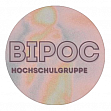
Bi_PoC-Hochschulgruppe Halle
Die Bi_PoC Hochschulgruppe Halle ist eine Gruppe von Studierenden für Studierende, die sich für ein diskriminierungsfreies Studium und das Empowerment von Bi_PoC-Studierenden einsetzt.
BiPoC (Black, Indigenous and People of Color) ist eine Selbstbezeichnung von Menschen mit Rassismuserfahrungen, die nicht als weiß, deutsch und westlich wahgenommen werden und/oder sich nicht so definieren.
Es geht dabei nicht um Hautfarben, sondern um die Benennung von Rassismus und den Machtverhältnissen in einer mehrheitlich weißen Gesellschaft. Es geht geht der Gruppe um die Sichtbarmachung, Vernetzung und das Empowerment von Bi_PoC in Halle.
Mail: bipoc.unihalle@web.de
Instagram
[ mehr ... ]
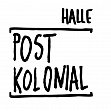
Halle Postkolonial
Die von Studierenden unterschiedlicher Fachrichtungen gegründete Gruppe "Halle Postkolonial" ist eine Gruppe junger Aktivist*innen. Die Gruppe sieht sich als Teil einer größeren Bewegung, welche sich in zahlreichen Städten für die Bekämpfung von kolonialen Kontinuitäten einsetzt. Neben anderen Aktionsformen führen sie regelmäßig Stadtrundgänge durch, um am Beispiel von Orten in der Stadt aufzuzeigen, wie der rassistische, antisemitische Normalzustand durch die fehlende Thematisierung und Bekämpfung von Strukturen, die seit der Kolonialzeit bestehen, aufrechterhalten wird (unter anderem). Neben Bildungsarbeit legen sie Wert auf antirassistische Solidaritäts- und Vernetzungsarbeit in der Stadt.
[ mehr ... ]
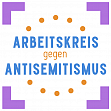
Arbeitskreis gegen Antisemitismus des Stura
Der Arbeitskreis gegen Antisemitismus ist eine Initiative von Studierenden, die sich für die Bekämpfung von (jedem) Antisemitismus auf dem Campus und in der Gesellschaft engagieren. Ziel ist es, ein Bewusstsein für die Formen und Folgen antisemitischer Einstellungen und Handlungen zu schaffen und Räume für Information, Dialog und aktive Unterstützung zu bieten.
[ mehr ... ]
Jüdischer Safe Space für Studierende, Azubis und Lehrkräfte in Halle
In Städten wie Halle kann es sich anfühlen, als wäre man die einzige jüdische Person auf dem Campus, im Freund*innen-Kreis oder in der gesamten Stadt. Doch wir sind hier, um euch zu sagen: ihr seid nicht allein. Vor dem Hintergrund der noch immer aktuellen Geschehnisse haben wir beschlossen, einen Safe Space zu schaffen für jüdische Student*innen, Azubis und Lehrkräfte aller Backgrounds an Unis und Lehrstätten im Raum Halle/Leipzig. Wir denken, dass es gerade jetzt wichtig ist, zusammenzukommen, sich auszutauschen und sich gegenseitig Halt zu geben. Unser Wunsch ist es, euch ein Gefühl von Sicherheit und Gemeinsamkeit zu geben. Die Ereignisse seit dem 07. Oktober 2023 und die darauf gefolgten Entwicklungen gehen vielen von uns an die Substanz. Die Angst, die sich in unseren Köpfen breit macht, ist seit vielen Generationen in uns verankert. Manchmal ist die Angst für nicht-jüdische Personen schwer zu greifen, auch wenn es versucht wird. Manchmal ist man es auch einfach leid, sich andauernd zu erklären. Bei uns werdet ihr das nicht müssen. Wir wollen euch eine Pause ermöglichen. Eine Pause vom Erklären und vom Unverständnis.Jüdisch zu sein bedeutet hier nicht, eure Gemeindemitgliedschaft oder euren Stammbaum vorweisen zu müssen. Hiermit sind ausdrücklich alle jüdischen Personen gemeint, welche sich als solche identifizieren. Ganz egal, auf welcher Familienseite du jüdisch bist, ob du religiös bist oder nicht, ob du viel oder wenig Bezug zu deinen jüdischen Wurzeln hast...Das Angebot beginnt im Januar 2024. Die Teilnahme ist über ein Anmeldeformular möglich. Der genaue Veranstaltungsort wird nach Anmeldung bekannt gegeben. Es besteht ein Sicherheits- und Awarenesskonzept. Ein gültiges Ausweisdokument ist erforderlich.
Ein Angebot mit freundlicher Unterstützung durch:
Judaistik / Jüdische Studien der Universität Halle
Jüdische Allianz Mitteldeutschland
Halle gegen Rechts – Bündnis für Zivilcourage
[ mehr ... ]
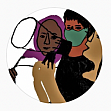
Migrant Voices Halle
Migrant Voices Halle ist ein Zusammenschluss von migrantisierten und eingewanderten Menschen in der Stadt Halle (Saale).
[ mehr ... ]
Jüdische Studierendenunion Deutschland
Die JSUD ist die bundesweite Verretung jüdischer Studierender und junger jüdischer Erwachsener in Deutschland. Ihre Aufgaben sind:
- der Vertretung der Interessen jüdischer Studierender und junger jüdischer Erwachsener sowohl nach innen
als nach außen
- der Förderung jüdischen Bewusstseins bei jüdischen Studierenden und jungen jüdischen Erwachsenen
sowie ihre Solidarität untereinander
- der Bekämpfung jeder Form rassistischer, fremdenfeindlicher, religiöser und politischer Diskriminierung, insbesondere des Antisemitismus
- der Sensibilisierung und Information der nicht-jüdischen Öffentlichkeit in Deutschland für jüdische Themen
- der Förderung der Solidarität mit dem Staat Israel
- der Förderung zivilgesellschaftlichen Engagements und die Stärkung der Demokratie in Deutschland
[ mehr ... ]
Netzwerk jüdischer Hochschullehrender in Deutschland, Österreich und der Schweiz
Seit dem 7. Oktober 2023 hat der Antisemitismus an Hochschulen in Deutschland, Österreich und der Schweiz dramatisch zugenommen. Zahlreiche jüdische Studierende, Lehrende und Hochschulmitarbeiter fühlen sich an ihren Universitäten nicht mehr sicher. Viele verbergen ihre jüdische Identität und meiden den Campus aus Angst vor Anfeindungen. Das Netzwerk jüdischer Hochschullehrender wurde Ende 2023 gegründet, um jüdischen Hochschullehrenden eine Plattform und Stimme zu geben. Der Verein und das Netzwerk, bestehend aus über 160 Mitgliedern.
[ mehr ... ]

Projekte und Maßnahmen an der MLU

Beteiligung der Uni Halle am Kompetenznetzwerk Hochschulische Antisemitismusprävention
Juni 2025
Die Hochschulrektorenkonferenz (HRK) hat im Rahmen eines neuen Projekts das "KoNHAP – Kompetenznetzwerk Hochschulische Antisemitismusprävention" gegründet. Es befasst sich mit der Vernetzung der hochschulischen Beauftragten gegen Antisemitismus sowie Personen, die diese Aufgaben in anderer Funktion wahrnehmen, und Erfahrungsaustausch zu Antisemitismusprävention und -forschung, Unterstützung der HRK-Gremien zum Thema Antisemitismusbekämpfung und -prävention, Evaluierung von und Beratung zu Fort- und Weiterbildungsmaßnahmen sowie Organisation von Wissenstransferaktivitäten wie Veranstaltungen und Erarbeitung von Informationsmaterialien. Die Präventions- und Beratungsstelle Antidiskriminierung vertritt die Uni Halle im Netzwerk.
[ mehr ... ]
Universität gedenkt Mojssej Woskin-Nahartabi
Juni 2025
Mit einer Gedenkveranstaltung am Montag, 16. Juni 2025, ehrt die Martin-Luther-Universität Halle-Wittenberg (MLU) den in Auschwitz ermordeten jüdischen Wissenschaftler Mojssej Woskin-Nahartabi. Vorgestellt wird im Sessionssaal des Löwengebäudes der MLU erstmalig eine Druckfassung seiner 1924 an der Universität Halle vorgelegten Promotion. Die Ehrung knüpft an das Gedenken an die von den Nationalsozialisten ab 1933 entlassenen Hochschullehrer an und findet am Vortag der Verlegung von Stolpersteinen für die Familie Woskin-Nahartabi in Leipzig statt.
[ mehr ... ]
Jüdische Campuswoche
Mai 2025
Die Jüdische Campuswoche (JCW) 2025 bringt jüdisches Leben, Geschichte und Gegenwart auf den Campus der Martin-Luther-Universität Halle-Wittenberg. Die JCW findet das erste Mal in Halle statt. Mit einem vielfältigen Programm aus Vorträgen, Diskussionen und Stadtführungen lädt die JCW alle Interessierten ein, jüdische Perspektiven kennenzulernen und sich mit aktuellen gesellschaftlichen Fragen auseinanderzusetzen. Weitere Uni-Standorte, wie: Leipzig, Jena, Dresden und Chemnitz sind ebenfalls vertreten.
Seit ihrer Gründung im Jahr 2018 steht die JCW für die Stärkung jüdischer Perspektiven an deutschen Hochschulen. Ziel ist es, jüdisches Leben in seiner Vielfalt sichtbar zu machen, Begegnungen zu fördern und Raum für offenen Austausch zu schaffen. „In einer Zeit, in der der Antisemitismus aus allen politischen Richtungen zunehmend erstarkt, wird das Judentum immer unsichtbarer. Die Jüdische Campuswoche möchte diesem Trend entgegenwirken und die vielfältige Kultur des Judentums sichtbar machen.“ – so Alexander Tsyterer.
[ mehr ... ]
Foto-Ausstellung zeigt jüdisches Leben in Deutschland
April 2025
Momentaufnahmen von jüdischem Leben und jüdischer Kultur in Deutschland, festgehalten von den drei Fotografen Holger Biermann, Rafael Herlich und Benyamin Reich. Insgesamt 51 dieser Fotografien präsentiert das Haus der Geschichte der Bundesrepublik Deutschland in der Leih-Ausstellung "Schalom. Drei Fotografen sehen Deutschland". Zu sehen ist sie jetzt an der MLU. Die Vernissage findet am Dienstag, 8. April, im Löwengebäude statt.
[ mehr ... ]
Universität benennt Hörsaal nach Anton Wilhelm Amo
November 2024
Der Hörsaal IV am Steintor-Campus hat einen neuen Namen: Im November 2024 wurde er in "Hörsaal Anton Wilhelm Amo" umbenannt und erinnert an den bedeutenden Alumnus der Universität. An der Veranstaltung nahm auch die Botschafterin der Republik Ghana I. E. Gina Ama Blay teil. Anschließend schrieb sie sich in das Goldene Buch der Universität ein.
[ mehr ... ]
Wehrhafte Demokratie: Uni Halle bietet umfangreiches Programm zur Projektwoche
Mai 2024
Die Uni Halle veranstaltet von Montag, 3. Juni, bis Freitag, 7. Juni 2024, die Projektwoche "Wehrhafte Demokratie". Initiiert und maßgeblich getragen wird sie vom Institut für Politikwissenschaft der Philosophischen Fakultät I. Die Hochschulen im Land Sachsen-Anhalt beteiligen sich mit weiteren Veranstaltungen an der Projektwoche.
[ mehr ... ]
Aufruf: Wehrhafte Demokratie ernst nehmen – über AfD-Verbot nachdenken
Januar 2024
Mehr als 50 Wissenschaftler*innen der Martin-Luther-Universität Halle-Wittenberg haben eine intensive Debatte über den angemessenen Umgang mit der AfD gefordert. Die Demokratie sei herausgefordert wie lange nicht, heißt es in dem Papier.
[ mehr ... ]
Studientag der Theologischen Fakultät: Welche Rolle spielt Religion im Krieg?
Dezember 2023
Der Studientag "Theologien vor der Herausforderung von Krieg und Gewalt", der am 17. Januar 2024 an der Martin-Luther-Universität Halle-Wittenberg (MLU) stattfindet, beschäftigt sich mit einem Thema, das vor dem Hintergrund der Kriege in der Ukraine und im Nahen Osten aktueller kaum sein könnte. Welche Rolle spielt Religion im Krieg? Wird sie benutzt, ist sie friedensstiftend oder gleichermaßen immer ambivalent? In diesem Spannungsfeld diskutieren Wissenschaftler aus aller Welt gemeinsam mit den halleschen Theologen. Der Studientag ist eine Veranstaltung der Theologischen Fakultät mit den beiden evangelischen Landeskirchen Sachsen-Anhalts, die allen Interessierten offensteht.
[ mehr ... ]
"Ein greifbares Andenken": Ausstellung zu Amo eröffnet
Oktober 2023
Wie könnte eine zeitgemäße Erinnerung an Anton Wilhelm Amo aussehen? Eine erste Antwort gibt die neue Ausstellung "Fokus Amo. Bilder für einen Gelehrten", die im Kupferstichkabinett zu sehen ist. Hierfür haben neun hallesche Künstler*innen ein gemeinsames Werk geschaffen. Zur Vernissage am Donnerstag kamen über 100 Gäste aus Universität, Stadtgesellschaft und Politik.
[ mehr ... ]
Unigottesdienst: Gedenken an Opfer des 9. Oktober
Oktober 2023
Zum Semesterbeginn hat Universitätsprediger Prof. Dr. Friedemann Stengel in der Einführung zu seiner Predigt zum Gedenken an die Opfer des Attentäters aufgerufen. Er bat alle Gäste, nach dem Segen still die Marktkirche zu verlassen und sich der städtischen Gedenkveranstaltung am Roten Turm anzuschließen.
[ mehr ... ]
Policy Paper zu Geflüchteten: Gemeinschaftsunterkünfte verstoßen gegen Menschenrechte
Juli 2023
Geflüchtete in großen Gemeinschaftsunterkünften unterzubringen, missachtet ihre Menschenrechte und verhindert gleichzeitig ein effektives Migrationsmanagement. Zu diesem Schluss kommen Migrationsforscher der Uni Halle in einem neuen Policy Paper in der "Zeitschrift für Ausländerrecht". Darin beschreiben sie, wie die aktuelle Praxis zu psychischen und sozialen Problemen bei den Bewohnerinnen und Bewohnern beitragen kann und gleichzeitig eine bessere Integration verhindert. Die Forscher fordern eine umfassende Reform des Asylsystems und geben hierfür konkrete Handlungsempfehlungen ab.
[ mehr ... ]
Eine Uni – ein Buch: „Erinnern als ethische Ressource“
Juni 2023
„Erinnerung in Komplexität“: Im Juni 2023 ist das Projekt zu Charlotte Wiedemanns Buch „Den Schmerz der Anderen begreifen“ offiziell an der MLU gestartet – mit einem bewegenden Abend in der Aula, auch weil die Autorin selbst viele persönliche Einblicke in ihre Arbeit und ihr Leben gab.
[ mehr ... ]
Migration und soziale Ungleichheit in der Schule: MLU bietet neue Fortbildung für Lehrkräfte an
Juni 2023
Mit einem neuen Fortbildungsangebot unterstützt die Martin-Luther-Universität Halle-Wittenberg (MLU) Lehrerinnen und Lehrer beim Umgang mit kultureller Vielfalt. Die Lehrkräfte erhalten spezielle Fortbildungen und führen mit ihren Schülerinnen und Schülern ein Unterrichtsprojekt durch, in dem sich diese intensiv mit ihrer eigenen Identität befassen sollen. Das Thüringer Ministerium für Bildung, Jugend und Sport fördert das Projekt mit rund 600.000 Euro. Es soll Lehrkräften auch dabei helfen, Jugendliche aus Einwandererfamilien besser zu unterstützen und so die Bildungsungleichheit im Land zu reduzieren: In Thüringen verlässt jeder Vierte von ihnen die Schule ohne einen Abschluss.
[ mehr ... ]
Brandspuren eines vereinten Landes
Juni 2023
Die Erinnerung an die deutsche Einheit müsse auch eine Erinnerung an die rechte Gewalt Anfang der 1990er Jahre sein, sagen Prof. Dr. Till Kössler und Dr. Janosch Steuwer vom Institut für Pädagogik.
[ mehr ... ]
Wissenstransfer: Viel Lob für Videoreihe zum Migrationsrecht
April 2023
Gemeinsam mit dem Deutschen Roten Kreuz haben Juristinnen und Juristen der MLU eine Reihe von Schulungsvideos zum Migrationsrecht erstellt. Die erste Serie ist fertig und online frei verfügbar. Das Feedback aus der Praxis ist sehr positiv.
[ mehr ... ]
Podcast: Tagebücher im Nationalsozialismus
April 2023
Tagebuch schreiben war im Nationalsozialismus äußerst beliebt – und zwar bei Anhänger*innen des Regimes ebenso wie bei Kritiker*innen. Wer heute noch so ein Tagebuch seiner Großeltern hat, kann sich glücklich schätzen, denn man kann einiges daraus erfahren. Auch Melanies Großeltern haben ein solches Tagebuch für ihre Kinder geführt. Doch wie genau geht man vor beim Lesen? Und wie soll man sich dazu verhalten? Der Historiker Janosch Steuwer von der Uni Halle weiß das genau. Er hat 140 Tagebücher zwischen 1933 und 1939 untersucht. Er sagt: mit der sogenannten Machtergreifung im Januar 1933 drängte sich Politik in die Tagebücher förmlich hinein, denn das NS-Regime forderte die Menschen auf, sich mit ihm zu beschäftigen und das eigene Leben in dessen Ideologie einzupassen.
[ mehr ... ]
Ostdeutschland: Bessere Bildungschancen für Jugendliche aus Einwandererfamilien
Oktober 2022
Jugendliche aus Einwandererfamilien besuchen in Ostdeutschland deutlich häufiger das Gymnasium als im Westen. Ihr Anteil liegt mit 56 Prozent sogar deutlich über dem von Gleichaltrigen, deren Eltern in Deutschland geboren wurden – hier sind es rund 45 Prozent. Das zeigt eine repräsentative Auswertung zur Bildungssituation von jungen Menschen, die unter Leitung der Martin-Luther-Universität Halle-Wittenberg (MLU) durchgeführt wurde. Im Westen lernen gerade einmal 28 Prozent der Jugendlichen aus Einwandererfamilien am Gymnasium. Dieser große Unterschied zwischen Ost und West ist auch auf die soziale Herkunft der Eltern zurückzuführen, wie die Forschenden in der "Zeitschrift für Soziologie" schreiben.
[ mehr ... ]
Neues Projekt hinterfragt Afrikaforschung in Deutschland
September 2022
Das Projekt "African Studies in Germany through the lens of Critical Race Theory" hat sich bei der neuen Förderinitiative "Aufbruch - Neue Forschungsräume für die Geistes- und Kulturwissenschaften" der VolkswagenStiftung durchgesetzt: Ein Team der Universität Bayreuth, des Max-Planck-Instituts für Bildungsforschung in Berlin und der Martin-Luther-Universität Halle-Wittenberg (MLU) untersucht nun gemeinsam die Afrikastudien in Deutschland aus der Perspektive der Critical Race Theory. Die MLU erhält für das Projekt bis zu 138.000 Euro.
[ mehr ... ]
Struktureller Rassismus: Neues Forschungsprojekt und Ringvorlesung an der Uni Halle
Mai 2022
Mit den Grundlagen und Ursachen von strukturellem sowie institutionellem Rassismus befassen sich ein neues Forschungsprojekt und eine Ringvorlesung am Juristischen Bereich der Martin-Luther-Universität Halle-Wittenberg (MLU): Ein vom Bundesministerium des Innern und für Heimat (BMI) gefördertes Projekt untersucht, wie Entscheidungen in und Kommunikation von Behörden zu Diskriminierung führen können. Die Ringvorlesung beleuchtet die Thematik aus verschiedenen juristischen und gesellschaftspolitischen Perspektiven. Zum Auftakt der Reihe am morgigen Dienstag, 3. Mai, stellt Projektleiter Prof. Dr. Winfried Kluth ab 18 Uhr das neue Forschungsvorhaben vor. Die Veranstaltung findet online statt.
[ mehr ... ]
„Theater ist ein Ereignis“
Februar 2022
Wie werden Flucht und Migration im deutschen und französischen Theater behandelt? Welche neuen Möglichkeiten ergeben sich für Migrantinnen und Migranten? Und wie kann Theater dazu beitragen, politische Herausforderungen zu bewältigen? Diesen Fragen geht die Nachwuchsforschergruppe „Migration und Flucht“ nach. In dieser Woche treffen sich die Mitglieder in Halle zu einem Workshop. Die Romanistin PD Dr. Natascha Ueckmann betreut das Projekt seitens der MLU und spricht über die Forschung.
[ mehr ... ]
Aufarbeitung der Universitätsgeschichte: Wie politisch waren Ehrenpromotionen an der MLU?
Februar 2022
140 Ehrendoktortitel sind an der MLU zwischen 1933 und 1989 verliehen worden. Im Auftrag des Senats hat sich die Kommission zur Aufarbeitung der Universitätsgeschichte in den Diktaturen des 20. Jahrhunderts mit ihnen beschäftigt. Prof. Dr. Friedemann Stengel, Leiter der Kommission, und Doktorand Jakob Debelka sprechen mit dem Unimagazin über die Ergebnisse.
[ mehr ... ]
Neue Tafel: Uni erklärt Arbeit an Amo-Gedenken
Dezember 2021
Die MLU arbeitet an einem neuen Konzept zur Erinnerung an Anton Wilhelm Amo, den ersten afrodeutschen Akademiker an einer deutschen Universität, der in Halle und Wittenberg wirkte. Am Universitätsring haben der Rektor und der Vorsitzende der eingesetzten Rektoratskommission eine Tafel eingeweiht, die auf das Missverhältnis zwischen dem Kunstwerk „Freies Afrika“ und einer 1975 in der Nähe angebrachten Gedenkplatte für Amo hinweist.
[ mehr ... ]
„Eine differenzierte Erinnerung an Amo“
Juni 2021
Anton Wilhelm Amo war im 18. Jahrhundert der erste afrodeutsche Akademiker an einer deutschen Universität, er wirkte in Halle und Wittenberg. Doch wie gedenkt die MLU ihres Alumnus Amo heute? Mit dem Thema befasst sich eine Kommission des Rektorats. Deren Vorsitzender, der Prorektor für Forschung Prof. Dr. Wolfgang Paul, erklärt im Interview, wie es zu deren Gründung kam und was sich am Amo-Gedenken ändern soll.
[ mehr ... ]
Kulturelle Vielfalt: Wie lässt sich Vorurteilen in Schulklassen vorbeugen?
Juni 2021
Bisherige Ansätze, kulturelle Vielfalt an Schulen zu thematisieren, können Vorurteile verstärken anstatt sie abzubauen. Das legt eine Studie unter Leitung von Forschenden der Martin-Luther-Universität Halle-Wittenberg (MLU) und der Universität Potsdam nahe. In einer Befragung von mehr als 1.300 Schülerinnen und Schülern fand das Team auch heraus, dass ein nuancierter Umgang mit dem Thema diese negativen Effekte abfangen könnte: Kulturen sollten weniger schematisch und anhand von plakativen Beispielen, sondern als dynamisch, individuell und vielfältig besprochen werden. Die Ergebnisse erschienen in der Fachzeitschrift "Contemporary Educational Psychology".
[ mehr ... ]
Neue Impulse für Juristenausbildung: MLU startet Ringvorlesung zu Nationalsozialismus und Rassismus
Mai 2021
Die neue Verfassung Sachsen-Anhalts enthält einen Artikel, der jede und jeden Einzelnen verpflichtet, gegen die Verbreitung nationalsozialistischen, rassistischen und antisemitischen Gedankenguts vorzugehen. Doch was folgt daraus, und was bedeutet das für Hochschulen und speziell die Ausbildung von Juristinnen und Juristen? Diesen Fragen widmet sich eine neue Vorlesungsreihe an der Martin-Luther-Universität Halle-Wittenberg (MLU), die am Montag, 10. Mai, um 18 Uhr beginnt. Im Laufe der Reihe wird auch Richterin Ursula Mertens über ihre Erfahrungen im Prozess gegen den Attentäter von Halle berichten. Die Vorträge finden als Online-Veranstaltung statt.
[ mehr ... ]
Zwischen Hochliteratur und Rassismus: Das schwere Erbe amerikanischer Südstaaten
April 2021
„Belles and Poets“ heißt das Buch von PD Dr. Julia Nitz vom Institut für Anglistik und Amerikanistik, das insbesondere in den USA auf großes Interesse stößt. Denn in dem Sachbuch, das auf ihrer Habilitation basiert, kann sie anhand der Analyse von Tagebüchern acht reicher Südstaatenfrauen aus der Zeit des Amerikanischen Bürgerkriegs (1861-65) auch zeigen, wie tief bis heute Rassismus in der amerikanischen Gesellschaft verankert ist und wo die Traditionslinien verlaufen.
[ mehr ... ]
Neue Rektoratskommission zur Aufarbeitung der Universitätsgeschichte in den Diktaturen des 20. Jahrhunderts
2021
An der MLU wurde eine neue Rektoratskommssion einberufen, welche die Universitätsgeschichte in den Diktaturen des 20. Jahrhunderts aufarbeiten will. Den Vorsitz hat Prof. Dr. Friedemann Stengel.
[ mehr ... ]
Hochschulpreis für Theologie-Absolventin für Diplomarbeit zum
Begriff des Abendlandes und dessen Nutzung durch die Neue Rechte
Juli 2020
Die MLU-Absolventin Philine Lewek hat in diesem Jahr den Werner-Krusche-Hochschulpreis der Evangelischen Kirche in Mitteldeutschland (EKM) und der Evangelischen Kirche Anhalts erhalten. Ausgezeichnet wurde ihre an der Theologischen Fakultät eingereichte Diplomarbeit zum Begriff des Abendlandes und dessen Nutzung durch die Neue Rechte. Der hallesche Regionalbischof Dr. Johann Schneider hat den Preis am Dienstag übergeben.
[ mehr ... ]
Bücher aus Buchenwald
März 2020
Privatdozent Dr. Stephan Pabst hat ein ehrgeiziges Projekt gestartet: Er will die Literatur erschließen, die das Konzentrationslager Buchenwald hervorgebracht hat, und noch unbekannte Werke auch von osteuropäischen Autoren entdecken. Den Auftakt dazu bildete eine internationale Tagung in Weimar.
[ mehr ... ]
Studentisches Projekt: Die bittere Pille
2020
Wie beeinflussen soziale Faktoren deine Gesundheit? Welche Auswirkungen haben beispielsweise Lebensort oder Arbeitsplatz auf dein Wohlbefinden? Studierende der Journalistik und Medizin der Uni Halle schlucken gemeinsam die bittere Pille und gehen auf Instagram gesundheitlicher Benachteiligung auf den Grund. @bittere.pille möchte zeigen, wie die Umwelt Gesundheit in Anspruch nimmt. Das Projekt recherchiert in den Entstehungsorten von Erkrankungen und zeigt auf, dass Gesundheit eine gesamtgesellschaftliche Herausforderung ist.
Es setzt sich mit Thematiken auseinander, die sonst zu wenig Aufmerksamkeit bekommen. Diese präsentieren sie in verschiedenen Medienformaten auf ihrem Kanal. Hierbei geht es auch um Diskriminierungsthemen wie Rassismus im Gesundheitswesen.
Die bittere Pille ist Teil des Projekts "Diagnose:Unsichtbar", das die Auswirkungen sozialer Ungleichheit auf die Gesundheit in verschiedenen Formaten sichtbar macht. Entstanden ist das Projekt im Studiengang Multimedia und Autorschaft der MLU. Das Projekt wird vom internationalen Mediennetzwerk Are We Europe gefördert
Hinweis: Das Projekt wurde inzwischen in "upstream.mail" umbenannt.
[ mehr ... ]
Reichhaltige Geschichte: Jüdische Kulturtage in Halle
Oktober 2019
„Moderne im Judentum“ ist einen ganzen Monat lang das Thema bei der siebten Auflage der Jüdischen Kulturtage in Halle: 40 Veranstaltungen stehen ab dem 27. Oktober auf dem Programm. Organisiert wird es vom Freundeskreis Leopold Zunz-Zentrum, ausgerichtet von der Jüdischen Gemeinde zu Halle und vom Seminar für Judaistik/Jüdische Studien der Universität.
[ mehr ... ]
Seenotrettung im Mittelmeer: Hallesche Juristen analysieren die aktuelle Rechtslage
September 2019
Wer ist für Geflüchtete zuständig, die auf dem Meeresweg nach Europa kommen und dabei in Seenot geraten? Welche Aufgaben und Pflichten haben in diesen Fällen die Europäische Union und ihre Mitgliedstaaten? Und welche Rolle spielt dabei die Europäische Menschenrechtskonvention? Einen umfangreichen Überblick zu diesem komplexen Thema geben Rechtswissenschaftlerinnen und -wissenschaftler der Martin-Luther-Universität Halle-Wittenberg (MLU) in einem neuen Buch. Darin zeigen sie auch, warum die aktuelle Rechtslage zu vielen Problemen führt und welche Alternativen es gibt.
[ mehr ... ]
Die Formung jüdischer Traditionen
Mai 2019
Er arbeitet an einem Wissensschatz aus mehr als 3.000 Jahren. Zum 1. April ist Prof. Dr. Ottfried Fraisse an der halleschen Universität zum Professor für Judaistik/Jüdische Studien berufen worden. Der Wissenschaftler befasst sich zum Beispiel mit Fragen des Verhältnisses von Judentum und Islam in der Zeit vom Mittelalter bis in die Gegenwart.
[ mehr ... ]
MLU gibt sterbliche Überreste von indigenen Australiern aus den Meckelschen Sammlungen an Australien zurück
April 2019
Die sterblichen Überreste von fünf indigenen Australiern gingen aus den Meckelschen Sammlungen der MLU in Verantwortung von Australien über. An der sogenannten „Repatriation Ceremony“ nahmen von der halleschen Universitätsmedizin die Direktorin des Instituts für Anatomie und Zellbiologie (IAZ), Prof. Dr. Heike Kielstein, sowie der Vorsitzende des Fördervereins der Meckelschen Sammlungen und ehemalige Direktor des IAZ, Prof. Dr. Dr. Bernd Fischer, sowie der Leiter des Referats Hochschulmedizin im sachsen-anhaltischen Wissenschaftsministerium Uwe Paul teil. Außerdem waren die sächsische Wissenschaftsministerin Eva-Maria Stange und Vertreter von den Staatlichen Kunstsammlungen Dresden zu Gast; das Bundesland gab sterbliche Überreste von 37 Menschen an Australien zurück.
[ mehr ... ]
Studentisches Projekt: Hanoi X Halle. Vietnamesisches Leben vor und nach 1989 in Ostdeutschland
2019
Die MuK-Studierenden Vivien Cockshot, Nam Nguyen, Jan Petter und Linh Pham arbeiteten 2017 in einem Projekt die Geschichte Vietnamesischer Vertragsarbeiter in Deutschland vor und nach 1989 auf und fügten Erinnerungen, Interviews und Bilder zu einer multimedialen Geschichte zusammen. Das Projekt entstand im Rahmen des Praxisseminars: "Multimedia" unter der Leitung von Vertretungsprofessor Dr. Werner C. Barg.
Zum Jubiläum des Mauerfalls wurde die Scrollytelling-Website offiziell gelauncht und erzählt in drei Portraits vom alltäglichen Kampf um eine Zukunft, den eigenen Arbeitsplatz, gegen alltägliche Anfeindungen und Rassismus.
[ mehr ... ]
Sprachkurse für Geflüchtete: Aufs Studium vorbereitet
Juli 2018
2016 sind an der Uni Halle Angebote für Geflüchtete gestartet, die ein Studium aufnehmen wollen. Rund 600 junge Frauen und Männer haben bis Mitte 2018 allein spezielle Sprachkurse genutzt. Mit Hilfe von Fördermitteln des Landes und des Deutschen Akademischen Austauschdienstes (DAAD) geht es neben den notwendigen Sprachkenntnissen um die Beratung vor dem Studienbeginn. Auch studentische Hilfsprojekte werden unterstützt.
[ mehr ... ]
Zum Seitenanfang





![Foto: Sabine Wöller (Fotografin: Friederike Stecklum)
[Bildbeschreibung: Sabine Wöller steht auf dem Universitätsplatz, im Hintergrund
ist das Audimax zu sehen. Sie trägt ein schwarz-weiß gemustertes Hemd und einen
schwarzen Blazer, hat eine rot gefärbte Strähne und schaut lächelnd in die
Kamera.]](/im/1657270494_2670_00_420.jpg)
![Foto: Sozial- und Konfliktberatungsstelle
(Fotograf: Michael Deutsch)
[Bildbeschreibung: Das Foto zeigt Anke Märker, die sich lachend zwischen zwei
Fäuste, die mit roten Boxhandschuhen versehen sind, stellt. Sie trägt eine
gemusterte Bluse und hat braune Haare, die zu einem Zopf gebunden sind.]](/im/1657276145_2670_00_420.jpeg)
![Foto: Prof. Dr. Anita von Poser
[Bildbeschreibung: Das Foto zeigt Prof. Dr. Anita von Poser vor einem grauen
Hintergrund. Sie trägt ein dunkelblaues Shirt, hat Schulterlange braune Haare und
lacht in die Kamera.]](/im/1681717876_2670_00_420.jpeg)













